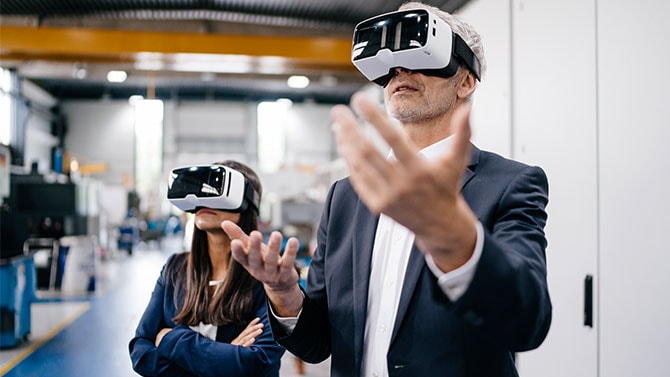{{item.title}}
{{item.text}}

{{item.text}}
Hype or the next big thing? It might already be time to take a closer look at what the metaverse can bring to your business.

Technology visionaries imagine that this world won’t run primarily on platforms whose owners control data, governance and transactions. That is the game changer. Instead, customers and businesses will be able to take their identities, currencies and assets anywhere they wish. And unlike today’s web experiences, much of this digital world will continue to exist even when no one is in it.
The metaverse is an evolution - not a revolution - that is based on the convergence of existing technology, bringing with it a world of opportunities
To some, the "metaverse" is the next great ®evolution of the digital world. Think about it. We already live in an increasingly interconnected world. Now this new concept of the future of the web promises to move the virtual and the physical even closer to us with the augmenting effects of maturing technologies. This transformational promise opens up new channels and methods of interaction - how we meet and build relationships with each other, how we spend, how we engage with products and services providers , and ultimately how we define our virtual "us".
Already, early adopting companies are looking to the metaverse to:
Everybody’s talking about cryptocurrencies, non-fungible tokens (NFTs) and other blockchain-based digital currencies, assets and exchanges. These will likely underpin value exchange across the metaverse. However, further innovation will be required as governments, companies and new, digital-only organisations work to build trusted digital monetary systems, offer new data monetisation propositions and conduct lending, payments, real estate investment and more in the metaverse. Decentralised autonomous organisations (DAOs) - with voluntarily agreed-upon rules enforced by a computer programme that runs on a blockchain - are set to take on more important roles.
A true metaverse requires seamless interoperability among users and platforms, based on web 3.0 and still-to-be-determined standards. While this interoperability will offer new possibilities to reach and understand customers, it will also raise new challenges for gathering and protecting data, and for cybersecurity and privacy. It may also undermine business strategies built around keeping users and their data in a given platform. Competitive advantage may shift to those companies that offer (through hardware or software) trusted ways for users to enter the metaverse.
Just as in the real world, the metaverse will require rules of engagement for users, rules for how the metaverse itself can evolve over time and enforcement mechanisms, including for tax collection, data governance and regulatory compliance. Early movers may be able to help set these rules. Security will be paramount, as a new, decentralised digital world may offer malicious players a new world of entry points for attack. Authenticity - and trust more broadly - should also be front and centre, to reduce the disinformation that has often plagued the internet.
In the internet today, identity is often linked to platforms. It may be true, pseudonymous or anonymous. The metaverse, decentralised and interconnected, will need trusted digital identities - for people, assets and organisations - that port across platforms. Companies active in digital identity now may both help set the metaverse’s standards and be able to offer a necessary service. Digital identities may also be central to permitted data collection and data governance in a decentralised environment.
A shared, persistent and immersive 3D digital world will offer unique experiences, based on its own aesthetics - beliefs, ideals and tastes as expressed in individual choices. Some trends for user experience are already becoming clear, in games and VR / AR environments. Companies that create trusted metaverse experiences and protect privacy rights may win consumer loyalty, while those that stay on top of metaverse trends may be well placed to forecast consumer preferences and behaviour.
A true metaverse should reflect in real time the changes made in it by different participants, entering and leaving it in different ways, in different places, at different times. When you take your metaverse headset off, the metaverse and other participants will continue their activities uninterrupted, with (for example) smart contracts enforcing agreements and trading assets. This persistence will likely require a new approach to digital assets and activities, including services and applications that are portable, dynamically configurable and extensible.
Most companies - even many technology companies - lack institutional familiarity with the metaverse’s concepts, which are evolving quickly.
Upskilling programs
Identify gaps to close and long-term opportunities to build from the metaverse and its key concepts, then work on foundational measures.
Strategy design and readiness assessment
Select a few opportunities available within the metaverse’s underlying trends today to offer new experiences to your customers.
PwC Metaverse hands-on
In addition to the immediate actions detailed above, the following steps will be key to build the capabilities that will help shape and support your success in the metaverse tomorrow.
The metaverse and its currently existing components offer new challenges for cybersecurity, privacy rights, regulatory compliance, brand reputation and anti-fraud efforts. Companies should, for example, consider security at the services level, so that no matter where your asset goes, security is maintained. To foster trust among consumers, shareholders, regulators and other stakeholders, communicate early what to expect from your metaverse initiatives and how you will mitigate the potential risks. Blockchain and AI, for example, can in some cases automate the authentication of identity, assets, transactions and contracts.
What offers competitive advantage in a shared, decentralised digital environment may be different from what you have today. You may need upskilling and recruiting to close skills gaps, as well as new approaches to data and business relationships. If, for example, your digital strategy is based on owning a digital platform, you will likely need to accelerate your services and security infrastructure. If you are working with a platform, assess how ready they are - and make sure that you can take your data with you if you switch providers.
If you have added or plan on adding digital services and/or assets to your portfolio, drive for a consistent brand experience across both the physical and digital constructs. Just as your web presence needs to match your physical location experience - so must your metaverse experience.
{{item.text}}

{{item.text}}
